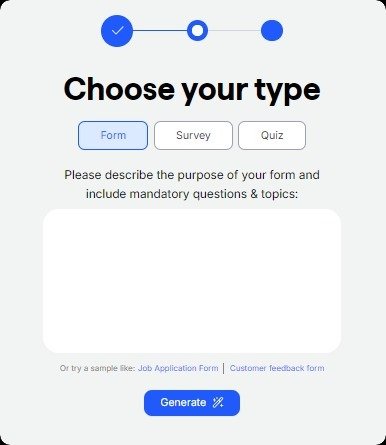Every Business Strives to Deliver Outstanding Customer Experiences, and Isn't It Crazy How Artificial Intelligence (AI) can Make This Happen in a More Efficient and Rapid Manner?
With its exceptional ability to analyze vast amounts of data, predict behaviors, and personalize interactions, AI is offering excellent solutions that not only meet but exceed these customer expectations.
A noteworthy statistic to consider:
“80% of business leaders now incorporate AI into their strategic planning and operational decisions“
In this article, we will explore myriad ways in which you can use AI to elevate every aspect of the customer journey and build deeper, more meaningful relationships with your customers.
AI-generated Forms and Surveys
Recent statistics shows:
89% of marketers have found that interactive content plays an important role in re-energizing user engagement.
Did you know you can create different interactive tools with AI-powered personalization platforms?
involve.me, an innovative AI form generator allows businesses to easily create engaging content, with minimal effort.
You just need to input your company’s URL and describe your use case and the platform can generate these tools within seconds.

Furthermore, incorporating an "AI-text generated" element within these tools facilitates the creation of personalized experiences for each customer. This level of personalized customer experience not only makes interactions more pertinent and enjoyable but also fosters higher engagement rates.
Moreover, it equips businesses with valuable insights on future customer behavior, enhancing their ability to shape effective marketing strategies. These AI-powered features in content creation empowers companies to concentrate on refining strategy and user experience, sidelining the complexities involved in content production.
Create your own AI forms and surveys
Just paste your URL and click generate
Chatbots and Virtual Assistants
AI-powered chatbots and virtual assistants offer a seamless and efficient means of communication between customers and businesses that is available around the clock. These digital assistants are designed to simulate human conversation, enabling them to handle a wide range of tasks—from answering frequently asked questions (FAQs) and booking appointments to providing detailed support on complex issues.
The key to their effectiveness lies in their ability to learn from interactions, which allows them to deliver more accurate and personalized responses over time.
Sephora, the beauty retail giant is successfully using this technology. The company has deployed a range of intelligent chatbots on various platforms, including its website and Facebook Messenger, to offer beauty advice, product recommendations, and even assist with booking makeup appointments at their stores. Sephora's AI-powered bot "Virtual Artist," for instance, uses AI to provide personalized makeup tutorials and product suggestions, enhancing the shopping experience and customer engagement.
This innovative use of chatbots improves customer service efficiency and also drives sales by offering tailored recommendations based on individual customer preferences.

Predictive Customer Service
Predictive customer service uses AI to anticipate customer issues and queries before they arise, allowing businesses to offer proactive support. This approach uses advanced analytics, machine learning algorithms, and customer interaction history to identify potential problems and address them preemptively. This strategy not only reduces customer frustration but also elevates the overall experience, fostering loyalty and trust.
A key benefit of AI-driven customer service is its ability to significantly improve customer satisfaction and retention rates. Customers appreciate the convenience and personalized attention they receive when issues are resolved swiftly and without the need for them to reach out for help. Furthermore, this leads to operational efficiencies by reducing the volume of incoming support requests and customer queries, allowing businesses to allocate resources more effectively.
For example, Netflix customer service team uses AI-powered solutions to monitor viewing patterns and technical performance data to predict and preemptively address issues such as buffering problems. The company analyzes this data and adjust its streaming quality in real-time or take other measures to ensure a smooth viewing experience.

AI-powered Security Measures
Today, businesses are implementing sophisticated systems capable of detecting and preventing fraudulent activities. These AI systems analyze patterns and behaviors that deviate from the norm, flagging suspicious activities and taking preemptive actions to protect customers' data and financial assets. This proactive strategy to security minimizes the risk of fraud and reassures customers that their transactions and personal information are secure, which is paramount in today's digital age.
A leading example of a company providing AI-powered customer experience to its users via AI-enhanced security measures is PayPal.
With millions of transactions processed daily, PayPal employs advanced Artificial intelligence technologies and machine learning algorithms to monitor transactions in real time for signs of fraudulent activity. PayPal's systems analyze a vast array of data points, such as transaction amounts, locations, and user behavior patterns to identify and prevent unauthorized transactions before they occur. This protects users from fraud but also enhances their confidence in using PayPal for secure online payments.

Visual Search and Recognition
Visual search and recognition technology is transforming the retail and e-commerce sectors by enabling target audience to search for products using images instead of text. This intuitive search method aligns with natural human behavior, significantly enhancing the shopping experience. Customers can find similar or identical products available for purchase by simply uploading a photo of an item they are interested in. This technology relies on AI to analyze the attributes of the image, such as shape, color, and pattern, to deliver accurate search results.
For example, Pinterest Lens allows users to take a photo of an item in the real world and then find related images or pins on the platform.

Personalized Product Recommendation Engines
Personalized product recommendation engines analyze a wealth of data about a customer's preferences, past purchases, browsing history, and even social media activity to deliver highly tailored product suggestions. This level of personalization ensures that customers are presented with items they are likely to be interested in, thus streamlining their shopping experience and increasing the likelihood of purchase.
The impact of personalized recommendations on the retail and e-commerce sectors has been profound. Businesses can significantly increase their average order value and conversion rates by making relevant suggestions. Customers benefit from a curated shopping experience that feels bespoke, saving them time and effort in finding products that meet their needs and desires. This mutual benefit fosters a positive feedback loop, enhancing customer loyalty and driving repeat business.
“35% of what consumers bought on Amazon came from its recommendation engine.“
Amazon analyzes customer data to offer highly relevant product suggestions, not only on individual product pages but also through email marketing and targeted advertising. This strategy has been a key factor in Amazon's success, contributing to its reputation for convenience and personalized shopping.

Wrapping Up
Throughout this discussion, we've explored several ways AI can be helpful for any business seeking to excel in the competitive marketplace.
I encourage you to adopt and adapt these AI tactics in ways that align with your business objectives and customer needs.
Use the power of AI to set your company apart and lead the way in delivering exceptional customer experiences.
Provide tailored experiences using involve.me AI form generator and AI-driven personalization now!
Create your own AI forms and surveys
Just paste your URL and click generate




